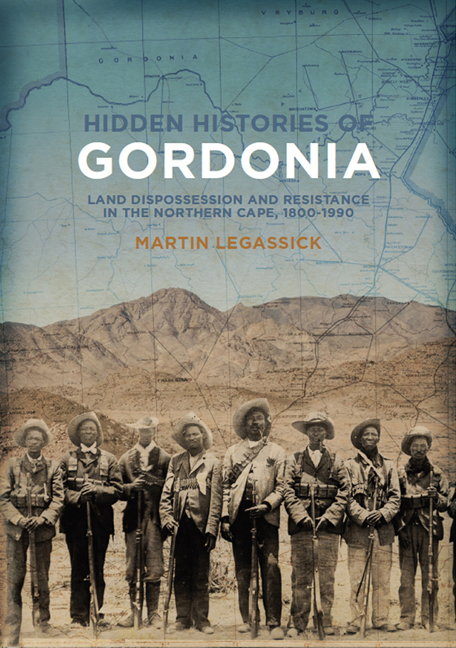Book contents
- Frontmatter
- Dedication
- Contents
- Acknowledgements
- Acronyms and abbreviations
- Illustrations
- Preface
- Chapter 1 The prehistory of Gordonia
- Chapter 2 The Baster settlement of Gordonia and its decline
- Chapter 3 The will of Abraham and Elizabeth September: a struggle for land in Gordonia, 1898–2014
- Chapter 4 From prisoners to exhibits: representations of Bushmen of the northern Cape, 1880–1900
- Chapter 5 South African human remains and the politics of repatriation: reconsidering the legacy of Rudolf Pöch
- Chapter 6 The early history of the brown Afrikaners in Riemvasmaak
- Chapter 7 The battle of Naroegas
- Chapter 8 The Marengo rebellion and Riemvasmaak, 1903–1907
- Chapter 9 The racial division of Gordonia, 1921–1930
- Chapter 10 Keidebees and Blikkies locations, Upington, 1894–1974
- Chapter 11 ‘All my powers have been swallowed by Upington’: the life and times of Alfred Gubula
- References
- Index
Chapter 3 - The will of Abraham and Elizabeth September: a struggle for land in Gordonia, 1898–2014
Published online by Cambridge University Press: 20 April 2018
- Frontmatter
- Dedication
- Contents
- Acknowledgements
- Acronyms and abbreviations
- Illustrations
- Preface
- Chapter 1 The prehistory of Gordonia
- Chapter 2 The Baster settlement of Gordonia and its decline
- Chapter 3 The will of Abraham and Elizabeth September: a struggle for land in Gordonia, 1898–2014
- Chapter 4 From prisoners to exhibits: representations of Bushmen of the northern Cape, 1880–1900
- Chapter 5 South African human remains and the politics of repatriation: reconsidering the legacy of Rudolf Pöch
- Chapter 6 The early history of the brown Afrikaners in Riemvasmaak
- Chapter 7 The battle of Naroegas
- Chapter 8 The Marengo rebellion and Riemvasmaak, 1903–1907
- Chapter 9 The racial division of Gordonia, 1921–1930
- Chapter 10 Keidebees and Blikkies locations, Upington, 1894–1974
- Chapter 11 ‘All my powers have been swallowed by Upington’: the life and times of Alfred Gubula
- References
- Index
Summary
In 1882 there was granted to one Abraham September, formerly a slave, by the Committee of Management, a farm facing the Orange River and lying about twelve miles above Upington. This old man discovered that there was the possibility of leading out the water of a lateral branch of the river on to some alluvial soil on his farm. He set to work and succeedded in getting a small stream on to a low-lying portion of his ground.
– Percy Nightingale, 25 July 1887From the foundation of Upington in the 1880s, irrigation of the Orange River has been central to its economic existence. Both north and south of the river in these parts are some of the driest lands of South Africa – the Kalahari to the north and Bushmanland to the south. But today, along a 280-kilometre stretch between the Buchuberg Dam and the Aughrabies Falls, centred on Upington, are some 25 000 morgen of immensely productive land. In the words of local publicist J.M. Brauer, it is ‘a heavenly greenbelt… a verdant paradise… [stretching] through irrigation settlements, along canals, past fields of lucerne, orange groves, vineyards, and past kameeldoring trees. You see green islands with patch-quilt farmlands and red-roofed houses, white stone bridges and suspension bridges made of wire strands laced with thousands of short wild tree poles.’
White historical mythology credits the DRC missionary C.H.W. Schroeder, who lived in the area in 1871–9 and 1883–1912, with the idea of irrigating the Orange. Such historiography takes for granted that white drive, innovation, and ‘know-how’, assisted at most by black labour, developed and ‘modernised’ South Africa. But, so far as irrigation of the Orange River is concerned, the quotation from Percy Nightingale at the start of this chapter sets matters straight. It is the preface to the following:
Mr Scott and Mr Schroeder hearing of this [Abraham September's irrigation], inspected the place, and as it seemed to them practicable to lead the water from this point on to the alluvial soil lining the river bank for many miles, even beyond the village of Upington, a meeting was called, and steps were taken to begin irrigation works on a scale of considerable magnitude. Many difficulties had to be faced, but they were all eventually overcome.
- Type
- Chapter
- Information
- Hidden Histories of GordoniaLand dispossession and resistance in the Northern Cape, 1800–1990, pp. 85 - 122Publisher: Wits University PressPrint publication year: 2016



